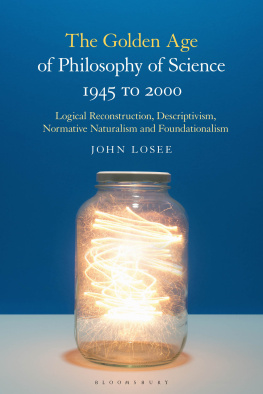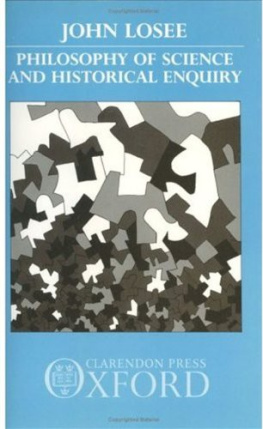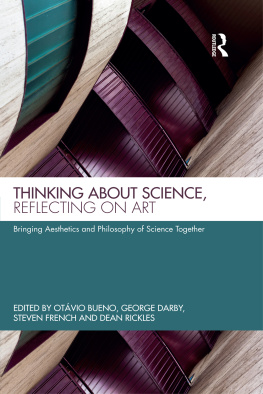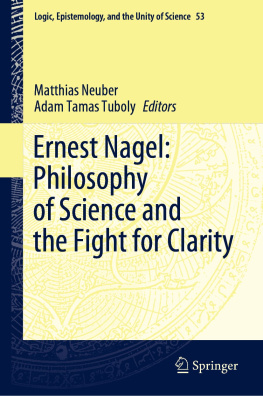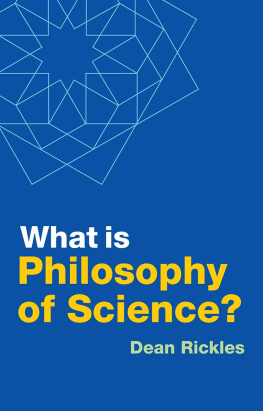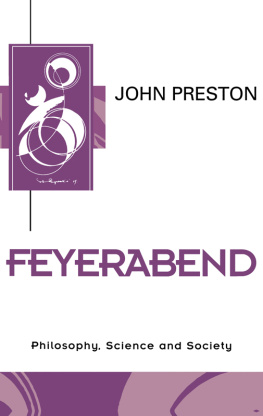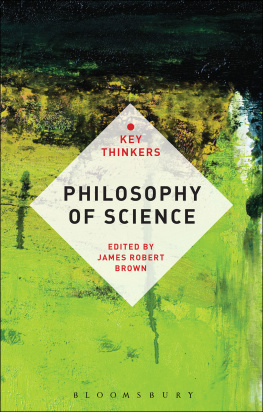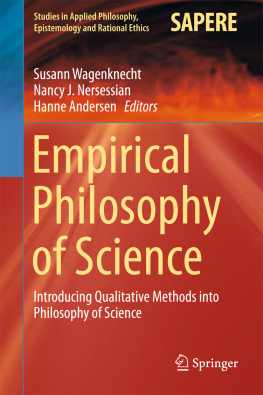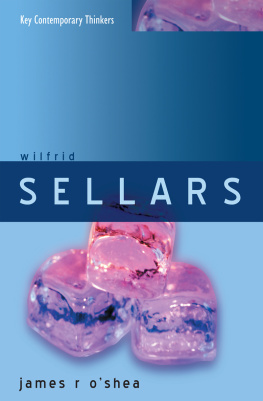
The Golden Age of Philosophy
of Science
Also available from Bloomsbury
The Bloomsbury Companion to the Philosophy of Science, edited by Steven French and Juha Saatsi
Getting Science Wrong, by Paul Dicken
God, Physics, and the Philosophy of Science, by Jeffrey Koperski
The History and Philosophy of Science: A Reader, edited by Daniel J. McKaughan and Holly VandeWall

Contents
Philosophers take a keen interest in reflexive questions about their discipline. What is philosophy? is a perennial topic for debate. Philosophers of science, like philosophers generally, have engaged in debates about the nature and scope of their discipline.
To claim that there exist competing philosophies of science is to claim that there is a discipline which individuals interpret differently. There is general agreement that philosophy of science is a second-order commentary on science, a commentary sensitive to questions about evidential support, theory-choice, and explanatory success.
During the period 1945 to 2000, four positions on the nature and scope of philosophy of science were proposed. These positions were (1) logical reconstructionism, (2) descriptivism, (3) normative naturalism, and (4) foundationalism. One aim of the present study is to formulate a taxonomy applicable to competing philosophies of science. A second aim is to seek answers to four questions that arise from this competition:
Should philosophy of science be a normative-prescriptive discipline?
If so, can philosophy of science achieve normative-prescriptive status without designating as inviolable some evaluative principles?
How ought competing philosophies of science be evaluated? and
What is the role of the history of science in this appraisal?
Overview
The Golden Age of Philosophy of Science is a contribution to the history of the philosophy of science. It sets forth the post-Second World War program for the logical analysis of science, the criticisms that displayed the limitations of this approach, and three methodologies proposed to replace it.
Logical reconstructionists dealt with methodological problems and evaluative problems by reference to logical relations among discrete levels of scientific language. Values of scientific concepts were related via operational definitions to statements of primary experimental data. These values were explained by formulating deductive (or inductive) arguments with laws as premises. Laws, in turn, were confirmed by logical relations to values of concepts, and ultimately to statements of primary experimental data. Theories were held to explain laws by exhibiting them as logical consequences. Theory-replacement was taken to be progressive if the successor theory incorporated, and extended, the range of its predecessor. A goal of the logical reconstructionist program was to provide explications for epistemological concepts such as explanation, confirmation, and theory-replacement.
Extensive and repeated criticisms of the logical reconstructionist program by Feigl, Achinstein, Feyerabend, and others (19651980) had a cumulative impact. Many philosophers of science came to believe that the disparity between actual scientific practice and the orthodox analyses of explanation, confirmation, and theory-replacement was too great.
One response to these criticisms of logical reconstructionism was to reconsider the very nature of the philosophy of science. Some philosophers of science maintained that the proper role of the discipline is the description of actual scientific evaluative practice.
There is a modest version and a robust version of descriptive philosophy of science. The aim of the modest version is the description of the evaluative practice of scientists. The robust version of descriptivism derives from, or superimposes upon, scientific practice a theory about this practice. The theory typically highlights a pattern displayed by, or a set of principles that informs, scientific evaluative practice. Some theories that have been proposed appeal to aspects of the theory of organic evolution. A robust descriptive philosophy of science is a contribution to our understanding of science. It purports to show why science is as it is.
Normative naturalism was a second response to the demise of logical reconstructionism. Normative naturalists deny the logical reconstructionist claim that there exist trans-historical, inviolable evaluative standards. They hold that evaluative standards arise within the practice of science and are subject to revision or rejection in the light of further experience. They claim, nevertheless, that evaluative standards have genuine normative-prescriptive force.
Foundationalists, by contrast, accepted the logical reconstructionist claim that there exist trans-historical inviolable principles that provide support for other statements within science. Candidates for foundational status include intra-theoretical consistency, direct observation reports, experimental laws, evaluative standards and cognitive aims. The Golden Age of Philosophy of Science concludes with an examination of the strengths and weaknesses of these alternatives to logical reconstructionism.
Sources of Logical Reconstructionism
Peano had done for mathematics. These mathematicians had clarified the structure of axiom systems, thereby creating a strong foundation for their discipline. Campbell recommended a similar study of the foundations of empirical science. He contributed analyses of the nature of measurement, the role of induction in the discovery of scientific laws, and the structure of scientific theories.
Campbell was not the first to pose questions about the structure of science. However, his statement of the aims of philosophy of science was widely shared. After the Second World War, the philosophy of science emerged as a distinct academic discipline, complete with graduate programs and a periodical literature. This professionalization occurred, in part, because many scholars adopted Campbells outlook. They believed that there were achievements to be won by the study of the foundations of science, and that science would benefit from this study.
In the early 1950s, however, doubts about this program arose. Skeptics suggested that the philosopher is not qualified to prescribe proper scientific procedure to the scientist. But then, what task remains? What is it that distinguishes the work of the philosopher of science from that of the historian of science or the sociologist of science? Perhaps the drama includes no role for the philosopher of science.
Five decades after Campbells study of the foundations of science, Paul Feyerabend cast a retrospective glance over the recent record of the philosophy of science. His conclusion was that
there is not a single discovery in this field (assuming that there have been discoveries) that would enable us to attack important scientific problems in
Is the philosophy of science guilty as charged? One purpose of the present study is to compile evidence upon which a verdict may be rendered.
The Legacy of Logical Positivism
The logical positivist position was that all genuine philosophical problems can be solved by a logical analysis of language, and that metaphysical claims can be shown to fall outside the range of cognitively significant discourse.
Next page
